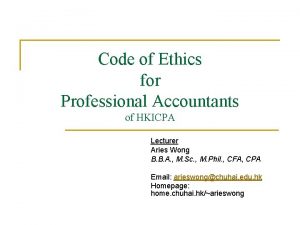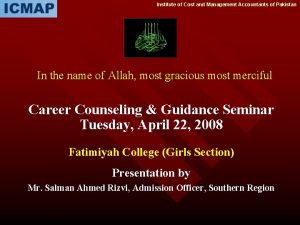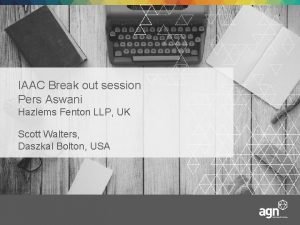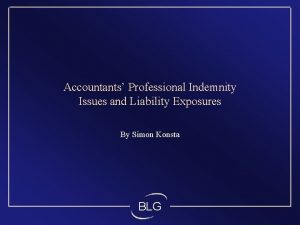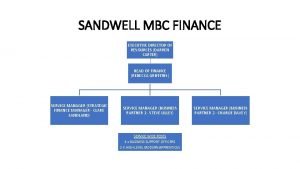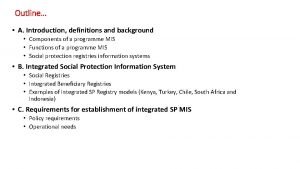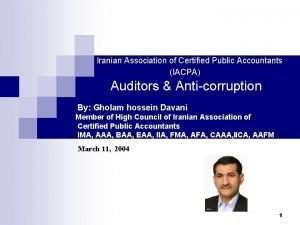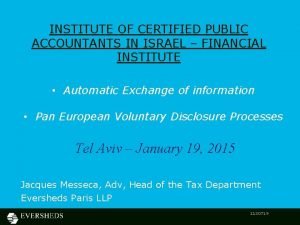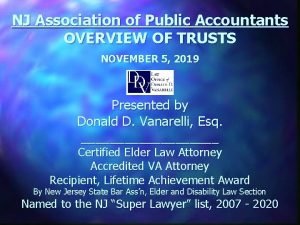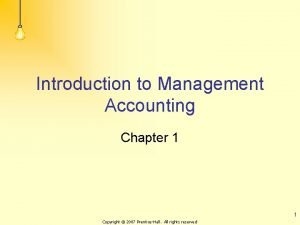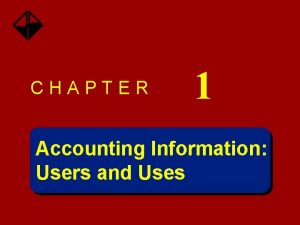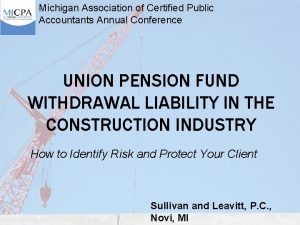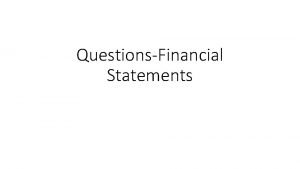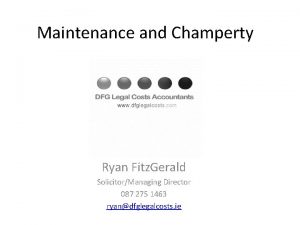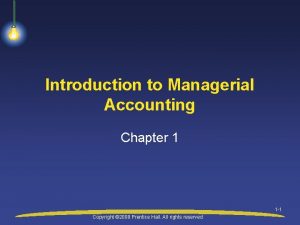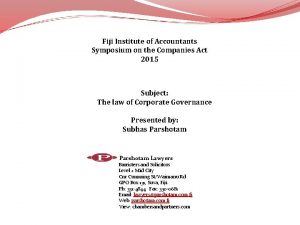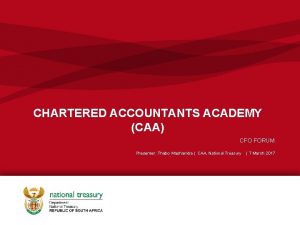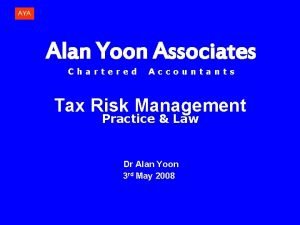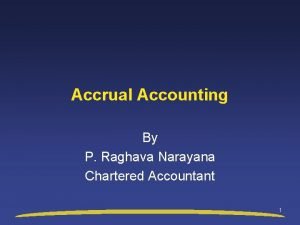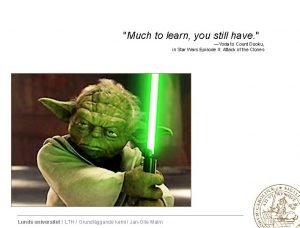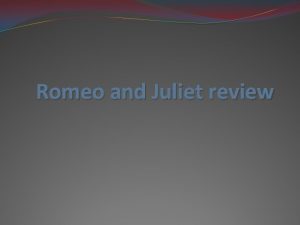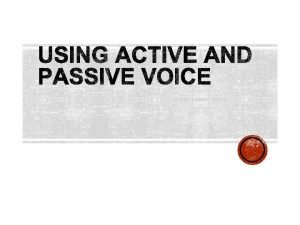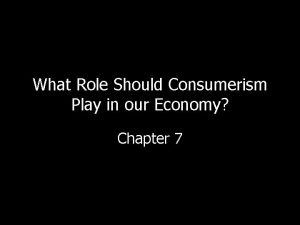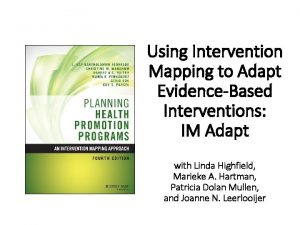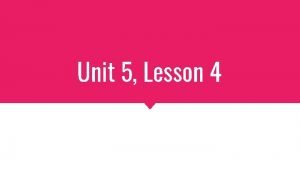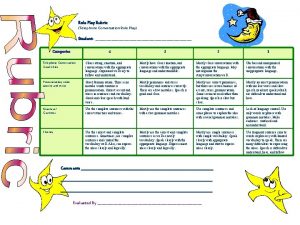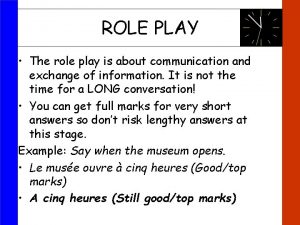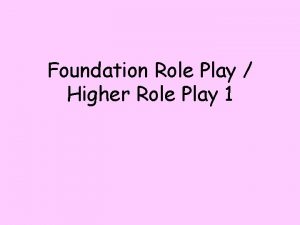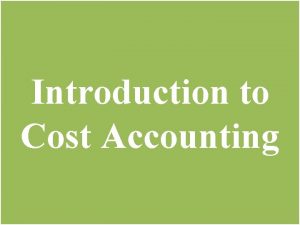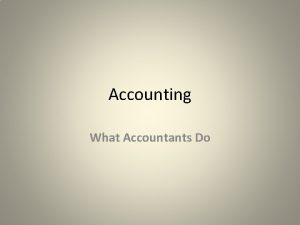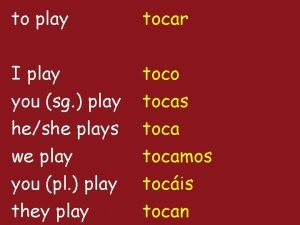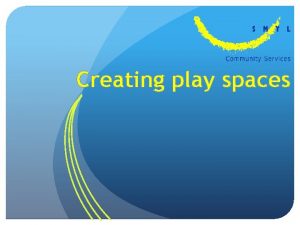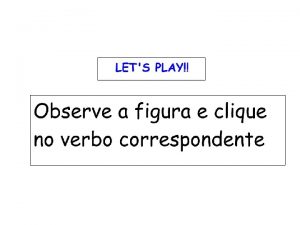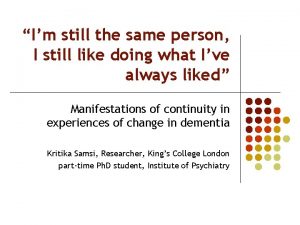WILL ACCOUNTANTS STILL HAVE A ROLE TO PLAY





























- Slides: 29

WILL ACCOUNTANTS STILL HAVE A ROLE TO PLAY IN THE FUTURE? & WHAT DO THEY NEED TO DO TO REMAIN RELEVANT? 8 April 2020 Mandi Olivier : SAICA Senior Executive: Professional Development

Factors impacting the future roles of accountants THE WORLD AROUND US HAS CHANGED SIGNIFICANTLY, SPECIFICALLY THE “WORLD OF WORK” Specific factors impacting the (future) world of work: Fourth Industrial VUCA Volatile Uncertain Complex Ambiguous Different skill sets are needed by employers Exponential rate of change Other factors Skills are as important as technical knowledge (our differentiator) The Accounting Profession needs to adapt to remain relevant

Other trends (besides tech) include: • • • Changing nature of work (Covid-19!) Future generation needs and expectations about the work place Innovation as a disruptor Longevity and aging societies Geopolitical Climate change and reducing natural resources Urbanisation Shift in industries Competition from other professions There is a need to adapt and to reshape ourselves for the future.

Top skills for the future • Future of Jobs report, World Economic Forum • Complex problem solving • Critical thinking • Creativity • People management • Coordinating with others • Emotional intelligence • Judgement and decision making • Service orientation • Negotiation • Cognitive flexibility Singularity University Hub (Raya Bidshahri) • Critical thinking and problem solving • Collaboration across networks and leading by influencing • Agility and adaptability • Initiative and entrepreneurship • Effective oral and written communication • Assessing and analysing information • Curiosity and imagination

How will roles of Accountants change? Future roles of accountants require change in the following ways Collaboration Skills which will inform the way CAs will need to think Integrated thinking Skills which will inform the way CAs will work Integrating new technologies Developing the necessary tools required for work Citizenship The way CAs contribute and live in the world

CAs(SA) WILL SURVIVE IF THEY ARE WILLING TO ADAPT AND CHANGE AND UPSKILL THEMSELVES “In an environment where new skills emerge as fast as others become extinct, employability is less about what you already know and more about your capacity to learn. ” Jonas Prising – Chairman and CEO, Manpower group

There is a need to prepare prospective accountants for jobs that don’t yet exist… There is also a need for existing accountants to reskill themselves for future roles…

What has changed? • Increased emphasis on digital acumen • Focus on creating sustainable value for a broad range of stakeholders • Ethics and citizenship • Integrated thinking • Balance learning and development of technical and non-technical competencies (= enabling competencies and professional values and skills) -

OVERALL OBJECTIVE IS TO DEVELOP Responsible leaders who behave ethically and create sustainable value for a wide range of stakeholders within an organisation. Using integrated thinking to interpret, analyse and evaluate financial and non-financial information. Enabling them to influence others, make impactful decisions and thereby contribute meaningfully to society.

Components of the Framework Professional values and attitudes Enabling competencies (defined as acumens) Technical competencies in the value creation process Elements of the professional competencies

Professional values and attitudes Ethical values and attitudes Citizenship values and attitudes Lifelong Learning Values and attitudes

Enabling competencies Decision Making Acumen Business Acumen: Relational Acumen Digital Acumen

Technical competencies in the value creation process

http: //capathways. co. za/

CA pathways to Relevance (Post Qualification Framework) 10 Career Paths identified Career Paths Auditing and Assurance Investment Management Consulting Industry Specific: Banking External governance Financial and tax / Board and other Management committees Innovation / Entrepreneurship Technology and Digital Enabler General Management Professional Education / Academia

CA Pathways to Relevance (Post Qualification Framework) 10 Career Paths identified Career Paths: Example Roles Investment Management Financial Planning and Decisionmaking, Financial Advisory, Investment Analysis, Merger and Acquisitions, Portfolio / Fund Management / Trading, Carbon Credit Trader, Digital Currency Trader. Financial and tax Managemnt Financial Management, Corporate Finance, Accounting and Tax, Management Accounting, Statutory Accounting, Tax Consulting, Compliance (tax), Environmental and Social Impact Accounting. Auditing and Assurance Audit and Assurance, External Audit, Internal Audit, Risk Management, Compliance (legal), Machine Risk Manager*, Environmental and Social Impact Auditor, Artificial Intelligence Auditor, Algorithm Bias Auditor*. Consulting, Management Consulting, Strategic Consulting, Business Analyst, Project Manager, Executive Coach, Environmental Consultants, Head of Machine Personality Design*, Artificial Intelligence and Robotics Impact Analyst, Vertical Farm Consultant*. Professional Educta 8 ion / Academia Professor, Academic, Education of Artificial Intelligence Solutions

CA Pathways to Relevance (Post Qualification Framework) 10 Career Paths identified Career Paths Innovattion / and(Entrepreneur) Entrepreneur, Founder, SME CFO, Start-up Incubator, Research and Development, Product Innovation, Artificial Intelligence and Robotics Solutions Technology and Digital Enabler Information Management, Database Management, Machine Learning Data Tagging Analyst, Cyber Calamity Forecaster* General Management Operational Management, Virtual Team Manager, Agile Workforce Manager, Chief Purpose Planner*, Head of Diversity and Inclusiveness, Head of Business Behaviour* Industry specific: External Governance / Board Banking and other committees Financial Services, Client Relationship Management, Structured Finance / Lending, Balance Sheet Management (ALM), Product Management, Carbon Credit Emissions Analyst, Subscription Management Specialist* Chairman, Non. Executive Director, Executive Coach, Board Advisor, Governance Committee Member, Environmental and Social Impact Committee Member, Diversity and Inclusivity Committee Member

CA Pathways to Relevance (Post Qualifications Framework) Career Paths: Competency Framework overview Ethically responsible leaders fulfilling their social mandate by using integrated thinking to create sustainable value Note: • ** indicates Future Focused competency

…The post qualification competency framework (Pathways to Relevance) will therefore play a critical role in informing relevant learning and development opportunities for different roles and levels of CAs(SA), this too informs the changes to the CPD policy, which changes the basis for measurement of lifelong learning for members… CONTINUING PROFESSIONAL DEVELOPMENT (CPD)

WHAT IS CPD? Maintaining and enhancing the knowledge, skills and experience related to professional activities following the completion of formal training (IPD). It includes the following: • Continual maintenance and development of professional competence (fit for role) • Demonstrating an attitude of life-long learning • Upskilling, reskilling and cross skilling

LIFELONG LEARNING RELEARN UNLEARN There is a need to adapt and to reshape for the future.

WHY DOES SAICA NEED TO HAVE A CPD POLICY? • To protect the public interest by : • ensuring there is a framework within which the members, • commit to ongoing learning and development throughout their careers, • demonstrating the competence required in relation to the specific roles an accountant performs • Ultimately assists in protecting the SAICA brands • Embodied in the Code of Conduct through the Principle of Professional Competence and due care

WHY DID SAICA REVIEW AND UPDATE THE Relevance & Best practice CPD POLICY? ADULTS LEARN DIFFERENTLY: UNDERSTAND HOW • Understand why and what value it LEARNING AND will add to them DEVELOPMENT TAKES • Want respect and to be seen as PLACE: capable learners • Unique and perform • Learn when they identify something different roles they want to know or become • Different needs proficient at, or when they • Learn in different ways experience something that connects • Learn at a different pace with their life situations • Want to learn when we • Responsive to external and internal need it not just in case… motivators

The new CPD policy Objective Is for members to: • maintain and develop their professional competence relevant to their current and future roles; • take responsibility for reflecting on and undertaking relevant CPD activities … • take responsibility for recording CPD activities…

The new CPD policy – Member obligations 1. Undertake relevant CPD activities - annually 2. Follow an output-based measurement approach to CPD generating an annual CPD reflective plan 3. Keep a record of the completed CPD reflective plan for most recent 3 calendar years 4. Submit a CPD reflective plan to SAICA when required to do so through SAICA’s monitoring process. 5. Submit an annual declaration to SAICA reporting on compliance with the CPD policy. 6. Undertake compulsory CPD as directed by SAICA from time to time. Includes: • What to do if you are a member of another member body • What to do if you also have to report to a regulator • Exemptions • Re-instatement

REFLECTIVE LEARNING PLAN • Identify current role and consider future role(s) • Determine what competencies the above roles require • Do a self assessment against these competencies (=knowledge, skills, attributes and values) • Identify competence gaps Identify what the most appropriate learning intervention is • Reflect on the effectiveness of the learning intervention • Continue with the above on an ongoing basis as and when necessary for your role

The new CPD policy – SAICA obligations 1. SAICA will monitor members’ compliance with the CPD policy annually. (annual declarations) 2. Sample size for monitoring (when selected: submission of Reflective plan, evidence of reflection and that relevant CPD activities have been undertaken) 3. SAICA will refer members who are non-compliant with the CPD policy to the Legal, Compliance and Discipline Department. Non-compliance means not submitting an annual declaration or not submitting the CPD reflective plan for monitoring purposes when required to do so

Still coming… • Tools to assist members in doing a competency gap analysis which includes Access to wider range of relevant learning and development interventions (pilot just launched) • Post qualification specialisations

Alvin Tofler Extract “Future Shock”(1972) “The illiterate of the 21 st century will not be those who cannot read and write, but those who cannot learn, unlearn and relearn…”
 Code of ethics for professional accountants
Code of ethics for professional accountants Institute of cost and management accountants of pakistan
Institute of cost and management accountants of pakistan Hazlem fenton accountants
Hazlem fenton accountants Accountants professional indemnity insurance
Accountants professional indemnity insurance Sandwell accountants
Sandwell accountants Mdd forensic accountants
Mdd forensic accountants جامعه حسابداران رسمی
جامعه حسابداران رسمی Institute of certified public accountants in israel
Institute of certified public accountants in israel New jersey association of public accountants
New jersey association of public accountants The institute of management accountants adopted the ______.
The institute of management accountants adopted the ______. Primary users of accounting information are accountants
Primary users of accounting information are accountants Michigan association of certified public accountants
Michigan association of certified public accountants Ritter corporation's accountants prepared
Ritter corporation's accountants prepared Dfg legal costs accountants
Dfg legal costs accountants Managerial accounting chapter 1
Managerial accounting chapter 1 Fiji institute of accountants
Fiji institute of accountants Egaming accountants
Egaming accountants Accountants academy
Accountants academy Ayaalan
Ayaalan Accrue chartered accountants
Accrue chartered accountants 8 faces 12 vertices
8 faces 12 vertices Halvcellsmetoden
Halvcellsmetoden Quotes from friar lawrence marrying romeo and juliet
Quotes from friar lawrence marrying romeo and juliet I've got a friend we like to play we play together
I've got a friend we like to play we play together Louise made the chocolate cake active or passive
Louise made the chocolate cake active or passive Typewriter types
Typewriter types Gozago
Gozago What role should consumerism play in our economy?
What role should consumerism play in our economy? Role play counseling script examples
Role play counseling script examples Role play tourist guide
Role play tourist guide
